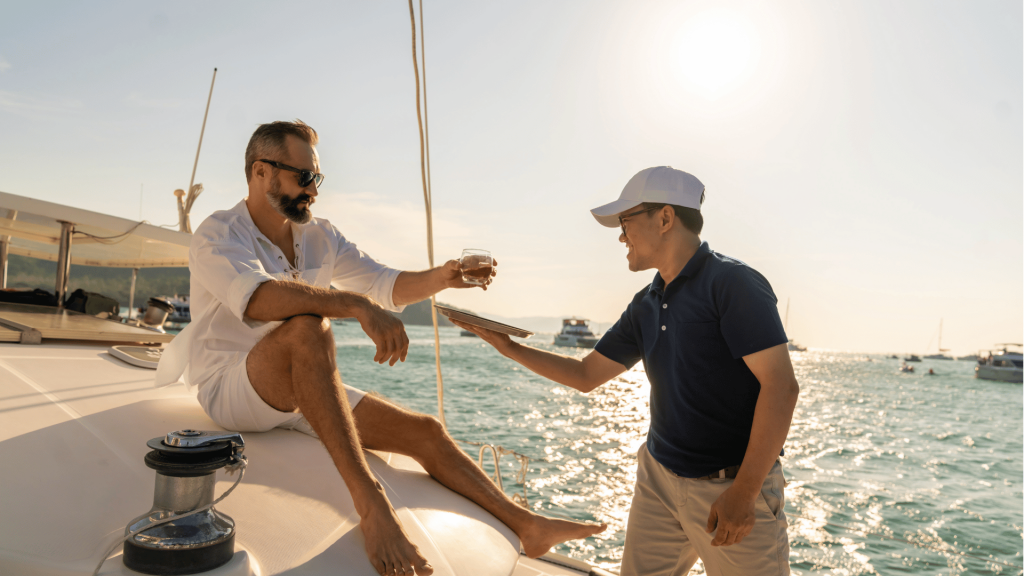How to Secure Your First Role Onboard Within the Hospitality Industry
Are you wondering how to secure your first role onboard within the hospitality industry?
Well if you've previously worked in hospitality – be it hotels, restaurants, event planning, or tourism, applying for jobs in these industries usually involves submitting your CV, attending the interview, and ensuring your references are in order.
But does it work the same for hospitality jobs at sea? And what do you do if you’ve got hospitality experience but have never worked onboard a ship?
Let’s find out!
Common Hospitality Jobs At Sea
Which job opportunities exist in the maritime hospitality industry? Broadly, there are three main options:
Cruise ships function as floating resorts and hotels – with a number of bars, restaurants, theatres, leisure facilities , and more rolled into one. Common maritime hospitality jobs include food and beverage service, housekeeping, entertainment, and guest services.
Specific job examples include restaurant staff, bartenders, chefs, housekeepers, performers, cruise and leisure staff and more.
Commercial ships, like ferries, cargo ships or tankers, also have hospitality support staff. Common positions include chefs, cleaners, and stewards.
Superyachts are privately owned luxury vessels that are either chartered or used privately by their owners. Hospitality jobs at sea on board yachts include all interior positions such as chefs, steward/ess, and purser.

How to Apply for Your First Hospitality Job At Sea
Securing your first maritime hospitality job onboard one of these vessels isn’t easy. There’s often a lot of competition. But, if you’ve got previous high end hospitality experience, you can be successful.
Follow these steps to get started:
Step 1: Choose Your Sector
First, you must decide which vessel you want to work on. That will depend somewhat on your skillset. Cruise ships will be your go-to option if you’ve worked primarily in entertainment. Whereas, if you’ve got extensive culinary experience, you can work on board either of these three vessels.
Step 2: Ensure You’ve Got the Necessary Experience
Hospitality jobs at sea aren’t 100% parallel to their land counterparts. However, there are enough similarities that significant experience in the standard hospitality industry can help secure your first job onboard.
That could include working in hotels, restaurants, holiday parks, and other hospitality settings. You should have, at a minimum, customer service experience.
Step 3: Obtain Necessary Certifications
Perhaps the biggest difference from land-based positions is the qualifications required to work on a ship. You’ll want to get these before applying for a job to guarantee the best chance of success.
These include:
STCW Basic Safety Training - the legal minimum requirement for individuals wanting to work for commercial vessels over 24 metres, including cruise ships and superyachts.
You can book this course direct with the Maritime Skills Academy, part of the Viking Maritime Group here: STCW Basic Safety Training (BST)
Seafarers Medical Certificate proves you are fit and healthy enough to work on board a ship. It includes a doctor-administered examination.
Step 4: Prepare Your CV and Covering Letter
Like any job, you must prepare a CV, cover letter, and references. Ensure you emphasise your existing skills in the hospitality industry, willingness to adapt to new conditions, and explain why you want to pursue a career at sea.
Step 5: Apply for Jobs
Again, just as in any other hospitality sector, you’ll need to find and apply for jobs. You’re unlikely to find maritime hospitality jobs listed in the usual job sites. Search for roles at Viking Crew - using our maritime job search portal dedicated to hospitality jobs at sea.
You can also look on our social media for roles we advertise including our LinkedIn group and Facebook group dedicated solely to maritime career opportunities.
Step 6: Prepare for the Interview
If your initial application is successful, it’s interview time. This is likely to be undertaken online, using a video platform. Unlike other candidates, you’ll have to defend your lack of maritime experience. Research the company and showcase your commitment to learning about the industry, as well as building on your current career to date in hospitality.

As with most things in life, passion goes a long way. Talking about your love of the sea or an experience holidaying on board a cruise ship can wow an audience and put you ahead of other, more experienced candidates. You can teach many skills, but passion isn’t one of them!
Step 7: Understand Your Contract
It’s uncommon to live on board your workplace (or for your workplace to travel the world). But that’s part of the deal. Read the contract carefully, understanding the terms and conditions, contract length, working hours, and responsibilities.
If you’re looking for your first hospitality job at sea or would like expert CV advice, Viking Crew is a leading maritime job portal. Find your perfect job today!

